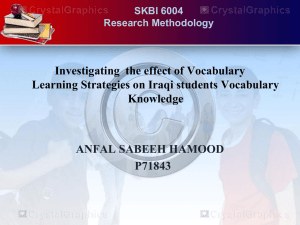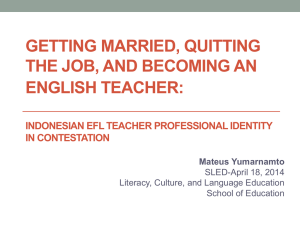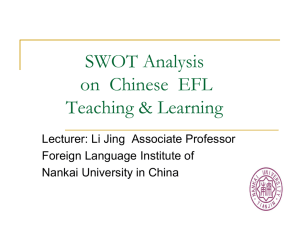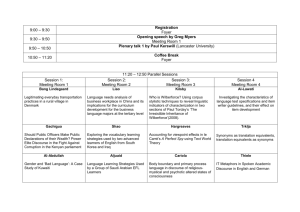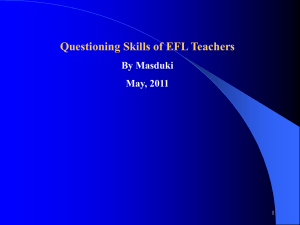Language curriculum design.
advertisement
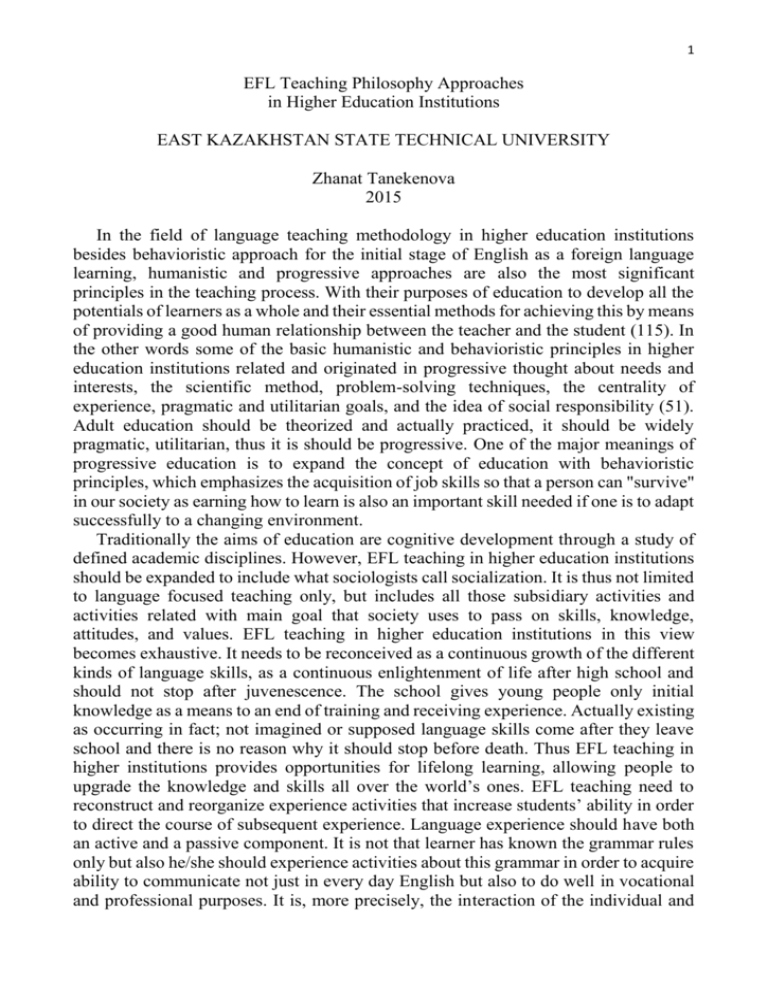
1 EFL Teaching Philosophy Approaches in Higher Education Institutions EAST KAZAKHSTAN STATE TECHNICAL UNIVERSITY Zhanat Tanekenova 2015 In the field of language teaching methodology in higher education institutions besides behavioristic approach for the initial stage of English as a foreign language learning, humanistic and progressive approaches are also the most significant principles in the teaching process. With their purposes of education to develop all the potentials of learners as a whole and their essential methods for achieving this by means of providing a good human relationship between the teacher and the student (115). In the other words some of the basic humanistic and behavioristic principles in higher education institutions related and originated in progressive thought about needs and interests, the scientific method, problem-solving techniques, the centrality of experience, pragmatic and utilitarian goals, and the idea of social responsibility (51). Adult education should be theorized and actually practiced, it should be widely pragmatic, utilitarian, thus it is should be progressive. One of the major meanings of progressive education is to expand the concept of education with behavioristic principles, which emphasizes the acquisition of job skills so that a person can "survive" in our society as earning how to learn is also an important skill needed if one is to adapt successfully to a changing environment. Traditionally the aims of education are cognitive development through a study of defined academic disciplines. However, EFL teaching in higher education institutions should be expanded to include what sociologists call socialization. It is thus not limited to language focused teaching only, but includes all those subsidiary activities and activities related with main goal that society uses to pass on skills, knowledge, attitudes, and values. EFL teaching in higher education institutions in this view becomes exhaustive. It needs to be reconceived as a continuous growth of the different kinds of language skills, as a continuous enlightenment of life after high school and should not stop after juvenescence. The school gives young people only initial knowledge as a means to an end of training and receiving experience. Actually existing as occurring in fact; not imagined or supposed language skills come after they leave school and there is no reason why it should stop before death. Thus EFL teaching in higher institutions provides opportunities for lifelong learning, allowing people to upgrade the knowledge and skills all over the world’s ones. EFL teaching need to reconstruct and reorganize experience activities that increase students’ ability in order to direct the course of subsequent experience. Language experience should have both an active and a passive component. It is not that learner has known the grammar rules only but also he/she should experience activities about this grammar in order to acquire ability to communicate not just in every day English but also to do well in vocational and professional purposes. It is, more precisely, the interaction of the individual and 2 his/her environment. EFL competence needs to be raised among students’ higher education graduates, in terms of KZ programs aimed at providing language ability in Russian, English and Kazakh. Consequently, the curriculum of EFL teaching in higher education institutions should be included interface with a vocational, practical activities and vocationally oriented consequence. As a result, EFL teaching should value the experience-centeredness, which related to progressivism in education. Knowles (1970) has contended that the quality and quantity of personal experiences of adults provide a rich learning resource that can contribute to a more experienced approach to education. (63) It means that within progressive philosophical approach in EFL teaching learners should learn vocational English course thus in Technical University students must learn Technical English Course, in Business University students must learn Business English Course in order to keep on training their main professional skills in higher education and combine business with pleasure. Thus, it is inclined to be hopeful about the growth of human potentialities in the suitable environmental situations. For this reason, the person could achieve a more satisfying life, through experimental thinking and scientific method. In contemporary methodology of EFL teaching both methods should be utilized the theoretical with the practical level simultaneously. At the theoretical level needs to integrate unity between method and subject matter. How English will be taught is closely depends on why we teach and what we teach. EFL teaching should lay more stress on the individual teacher develop his/her own method of teaching suitable for the taught group. In the field of EFL teaching methodology in higher education institutions a noticeable method of teaching come from progressive and humanistic educators is a making progress at knowledge through a scientific method that included the activity method, the problem-solving method and the project method. The scientific method firstly presents the identifying and defining more precisely a challenge that needs to be solved, secondly the development of thoughts or assumptions about this challenge, and finally the proofing of these assumptions by a research of experimental evidence. This method used in the most subject areas and that it is based on the natural disposition of students to try hard to solve the problems. This empirical method is an effort to find out truths about the world where one lives. As for me as an educator, the scientific method means the most effective approach in learning process as it gives the integral motivation and meaningful attitude to the learning process. After having clarified the problem with designed curriculum related to the useless of work since designed one (it is only subject-centered), I was involved in resolving this problem. Thus, I was interested in ideas and hypothesis about this problem, which in turn stimulate me to study the Contemporary Methodology of EFL Teaching and EFL Curriculum Design courses. The results of the work show that another curriculum in terms of more humanistic (student-centered), progressive (experience-centered) and less behavioristic (each educational program should have clearly defined purposes, in order to change behavior) approaches will be more useful and effective. It leaves no doubt that testing of assumptions by an examination of experimental testimony results in a rich return for teaching and learning efforts, thus new curriculum is expected to be pragmatic. It is essential to point out that students need to feel they are accepted and 3 respected, because students in higher institutions are self-directed and they can determine their own educational needs themselves. It follows that classroom climate should be informal and cooperative. Such an approach to EFL teaching involves caring for students. It is less about controlling as compliance does not create passion and does not make the student wiser. Controlling does not lead to creativity and flexibility. It does not breed to great advantages. Under the progressive's view, EFL learning in the field of higher education is firstly the process within what the learners do for themselves. The educator’s duty is to provoke, to set up, assess and analyze the process of learning that is the highly complicated one. The educator promotes an appropriate classroom activities are more relevant to learning. For non-linguistic students it should be vocational-educational activities requiring students’ fluent English covering the core language and skills that students need to communicate successfully in all technical and industrial specialisations. The role of educator is a useful resource for students, educator is a builder of community and condition in which students can discover the meaning of their experience and activities, where they can find meaning in English learning and can bring their spirits to the learning process. They need to listen for students, ask them, watch and think what they teach and how, in terms of selection different kinds of materials and techniques and strategies in other words teachers should do conduct needs analysis. Precisely, within progressive and humanistic philosophical approaches educators in higher education institutions must look carefully and thoroughly at students especially so, as to appraise their needs and proficiency levels as well as their capacities. Simultaneously they must organize conditions that ensure the fulfilment of the English matter is included providing students with content for experiences, which satisfy identified needs and develop the capacities. This means particular attention in EFL teaching should be paid to curriculum design. The designed syllabus must be flexible enough to allow the learners free and easy play for personality of experience and yet strict too in order to make learners follow the continuous development of energy. Syllabus should be started with the student-centered idea. It follows, encouraging the development of positive attitudes toward language learning, through raising motivation and reducing a feeling of worry, nervousness or confusion about feedback as well as trough supporting different learning styles to give students support, hope and selfconfidence for firmness in the difficult and confusing process of learning another language. By this we imply that curriculum should be fixed to the state of affairs that include the current life outside of university, its subject specialists and the learners themselves with their needs to solve their vocational problems in terms of receiving education about precise the special subject. It means that problem must not be solved in the future, but right at the moment of learning. It is at this point that we can say that education is meaningful, which means that it is successful and effective in return. As a matter of fact, education which organized without the meaningful intent with focus just on learning of language itself results in a poor return of learning and teaching efforts. As for some institutions, it’s not caring enough about interests, problems and purposes of learners. It is really had better to emphasis in education, upon conducting needs, assessments for curriculum design, and instructional purposes in order to give 4 expression to this basic progressive orientation and to settle the atmosphere covered by independent learning among adults that is based upon the progressive and humanist assumption where a person is "a self-directing organism with initiative, intentions, choices, energy and responsibility" (Tough, 1971, 65). In so doing, the educator in turn becomes a learner, for the relationship between educator and learners is mutual, as he/she begins to acquire knowledge like students as well as about technical terms and the latest developments in technology by means of EFL teaching. It has direct impact on both of them educator and learner so that they should plan and learn from each other. This illustrates importance of the educator’s listening for students. For carrying out listening for students, it is necessary for educators to gather feedbacks in as many ways as possible from the students. The main point of this that teachers should not begin by means of their own knowledge or expertise. They should begin by means of the questions that will help identify learners’ needs, before they try to meet their needs: What do I really know about needs of my students? How do I ask them about it, and how often? Am I open to hearing things even I do not want to hear? Teacher will thrive because of listening and making sure that what syllabus offers is what students really need. “The poor content is chosen then the excellent teaching and learning result in a poor return for learning efforts.” (Nation, I. S. P. & Macalister ,70) In addition, it is not the main idea of the educator to benefit from the interests which already existed or aren’t at all in the learner about EFL learning, but also to awake the feeling of wanting to know or learn about those things which are educationally necessary. It is obviously that EFL teaching should be involved in compliance both content and methods but a very strict approach to teaching makes useless education. It is in this perspective that we need to interpret within the humanistic approach classroom activities. Therefore, they should occupy an integral part of instructional practices with special care that has to be taken in their construction by teachers. For these activities Moskovitz (1978, cited in Johnson & Johnson, 1998) enumerates some classroom settings: -lowing risk - it means that students are always sure they are supported by teacher and in any case they can receive an encouragement, in other words non-personally threatening activities, should be used by teacher especially in the very low rating, so students are considered to receive their passing mark (50) in the English discipline by means of flexibility the designed curriculum that allow them to receive their passing points; -the next classroom setting is intensifying the positive and avoiding the negative focus. It is really, bad idea to lay stress upon students’ failure or the gaps in education. It had better make up for a deficiency in a delicate and tactful way and offer a reward for some information about feedback. Projecting a positive mood by educator helps produce enthusiasm and cooperation among students, which in turn produce success for them; -the other classroom settings are a giving students the opportunity to verbalize before others something they like about themselves. This agency makes them to be open and reduce anxiety allowing them to be more progressive in EFL learning. Jointly with giving them the linguistically opportunity to practice the language for expressing 5 and the vocabulary by means of constructed in a special way activities. Thus, classroom activities encourage students to really look at their peers and focus on seeing the beauty of others, accepting themselves with being aware of their strengths and weaknesses. Learners have assurance they can perform at a high level. Building on the strengths and accepting their weaknesses, they are ready to build the strength and accept the weakness. It follows that learners become less likely to judge and more likely to encourage each other. In these classes, teachers are not the controllers but the actual facilitators. As cited in Wang (2005), within humanistic classrooms, the students’ multiple perspectives are valued and their errors admitted. Some of the cooperative activities, such as pair-work or group-work are good examples for this point and must be applied in EFL teaching, since in such activities, the students can best communicate their thoughts and the feeling of worry is much less. As a result stressing education's role in promoting public education experienced by behaviorists, humanists and progressives. There are some programs of contemporary higher institutions assert the influence humanistic, behavioristic and progressive philosophy. Some values of humanism like believing in the goodness and potentiality of each student; developing students’ self-actualization; believing in their self-government with placing the individual at the center of education will be followed corresponding closely to the social and cultural values of contemporary Kazakhstan, which can direct society toward good morality. As a result, educational programs of higher institutions should be student-centered on the needs and interests of the learners and derived from a Behavioristic, Humanistic and Progressive Philosophy. EFL teaching in Higher Education Institutions dedicated to the development of human beings. Progressives consider that the role of education is not just to graduate people for fitting into the existing society, but also to prepare individuals who would be interested in the process of getting the higher degree of proficiency level. Followers of these approaches have confidence in the future where fostering creativity and stability, as well as individuality and social consciousness, as the more graduated persons in society, the better society is. 6 References 1 Elias, J. L., & Merriam, S. B. (2005). Philosophical foundations of adult education (3rd ed.). Malabar, FL: Krieger Publishers 2 Kumaravadivelu, B. (2006). Understanding language teaching: from method to postmethod. Mahwah, NJ: Lawrence Erlbaum Associates, Inc. 3 Nation, I. S. P. & Macalister, J. (2010). Language curriculum design. New York, NY: Routlege 4 W. Tyler. The Journal of Educational Research, 879, 68-75. 5 Journal of Language Teaching and Research, Volume 4, Number 1, January 2013, ISSN 1798-4769. Humanistic Education: Concerns, Implications and Applications Mohammad Khatib, Saeid Najafi Sarem, and Hadi Hamidi

